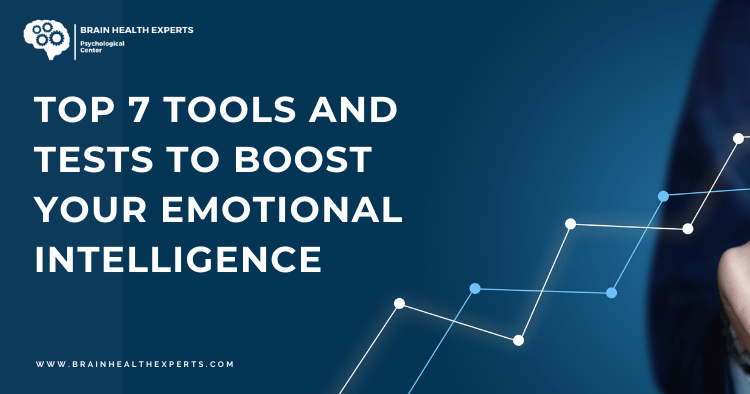Table of Contents
- What is Emotional Intelligence?
- Why is Emotional Intelligence Important?
- The Top 7 Tools and Tests for Emotional Intelligence
- 1. Emotional Quotient Inventory (EQ-i)
- 2. Mayer-Salovey-Caruso Emotional Intelligence Test (MSCEIT)
- 3. Six Seconds Emotional Intelligence Assessment (SEI)
- 4. Emotional Intelligence Appraisal
- 5. Genos Emotional Intelligence Inventory
- 6. Trait Emotional Intelligence Questionnaire (TEIQue)
- 7. The Bar-On Emotional Quotient Inventory
- How to Choose the Right Tool or Test
- FAQs about Emotional Intelligence
- Conclusion
What is Emotional Intelligence?
Emotional Intelligence (EI) refers to the ability to identify, understand, manage, and utilize emotions effectively—both your own and those of others. It’s a crucial skill that influences how we interact with others, make decisions, and navigate social complexities. Emotional intelligence encompasses several key components, including self-awareness, self-regulation, motivation, empathy, and social skills.
“Emotional intelligence is not about being nice; it’s about being aware.”
Why is Emotional Intelligence Important?
Emotional intelligence plays a vital role in personal and professional success. Here are a few reasons why it’s essential:
- Improved Relationships: Understanding emotional cues can enhance communication and foster better relationships.
- Enhanced Decision-Making: EI helps in evaluating situations more holistically, leading to better choices.
- Increased Resilience: Individuals with high emotional intelligence tend to manage stress and bounce back from setbacks more effectively. For more on resilience, check out 10 ways positive thinking boosts resilience in tough times.
- Career Advancement: Many employers value emotional intelligence as much as technical skills, as it contributes to teamwork and leadership.
“Emotional intelligence is the key to personal and professional success.”
The Top 7 Tools and Tests for Emotional Intelligence
1. Emotional Quotient Inventory (EQ-i)
The Emotional Quotient Inventory (EQ-i), developed by Reuven Bar-On, is one of the first measures of emotional intelligence. This self-report tool assesses various aspects of EI, including interpersonal skills, stress management, and decision-making.
- Format: Self-report questionnaire.
- Duration: Approximately 40 minutes.
- Key Features: Provides a comprehensive profile of emotional strengths and weaknesses.
You can learn more about the EQ-i here.
2. Mayer-Salovey-Caruso Emotional Intelligence Test (MSCEIT)
The MSCEIT, developed by Mayer, Salovey, and Caruso, evaluates emotional intelligence through a series of tasks that require individuals to perceive, use, understand, and manage emotions.
- Format: Performance-based test.
- Duration: About 30-40 minutes.
- Key Features: Measures both the ability to process emotional information and the application of this information in real-world scenarios.
For further details on the MSCEIT, visit this link.
“Emotional intelligence is the ability to use emotions to enhance thinking and performance.”
3. Six Seconds Emotional Intelligence Assessment (SEI)
The Six Seconds Emotional Intelligence Assessment (SEI) focuses on how emotional intelligence can enhance performance in various life domains. It measures EI competencies, personal and social effectiveness, and provides actionable feedback.
- Format: Self-report questionnaire with feedback report.
- Duration: 30-40 minutes.
- Key Features: Offers a clear action plan for development.
Learn more about the SEI here.
4. Emotional Intelligence Appraisal
The Emotional Intelligence Appraisal is a straightforward tool that provides insights into your emotional intelligence skills and how they impact your life. It includes a self-assessment and a 360-degree feedback option.
- Format: Self-report with optional peer assessments.
- Duration: Approximately 20 minutes.
- Key Features: Offers a personalized development plan based on results.
You can explore the Emotional Intelligence Appraisal here.
“Understanding your emotional intelligence is the first step toward improving it.”
5. Genos Emotional Intelligence Inventory
The Genos Emotional Intelligence Inventory is designed for workplaces, focusing on how emotional intelligence impacts workplace behaviors and performance. It offers individuals and organizations tools to improve their emotional intelligence.
- Format: Self-report and observer assessments.
- Duration: 30-40 minutes.
- Key Features: Provides an organizational report for team development.
For more information, check out the Genos Emotional Intelligence Inventory here.
6. Trait Emotional Intelligence Questionnaire (TEIQue)
The TEIQue measures various aspects of trait emotional intelligence, including emotional perception and emotional regulation. It can be beneficial for both personal insight and professional development.
- Format: Self-report questionnaire.
- Duration: 15-20 minutes.
- Key Features: Generates a comprehensive profile of emotional traits.
Find out more about the TEIQue here.
7. The Bar-On Emotional Quotient Inventory
Developed by Reuven Bar-On, the Bar-On EQ-i assesses emotional and social functioning. It provides insights into how emotions affect behavior, relationships, and overall well-being.
- Format: Self-report questionnaire.
- Duration: About 40 minutes.
- Key Features: Offers a detailed report with scores in various emotional intelligence domains.
You can learn more about the Bar-On EQ-i here.
How to Choose the Right Tool or Test
Selecting the right emotional intelligence tool or test depends on your specific needs and context. Here are some questions to consider:
- Purpose: Are you looking for personal development, team improvement, or organizational assessment?
- Format: Do you prefer self-reports, performance-based assessments, or multi-rater feedback?
- Time Commitment: How much time can you dedicate to the assessment?
- Depth of Insight: Do you want a comprehensive analysis or a quick overview?
By answering these questions, you can better identify which emotional intelligence tool best suits your needs.
“Choosing the right tool is crucial for effective emotional intelligence assessment.”
FAQs about Emotional Intelligence
Q: Can emotional intelligence be developed?
A: Yes, emotional intelligence can be cultivated through practice and training. Engaging with tools, attending workshops, and reflecting on your emotional responses can enhance your EI. Consider looking into top 5 emotional intelligence training programs for 2024 for further development.
Q: How does emotional intelligence differ from IQ?
A: Emotional intelligence focuses on the ability to manage emotions and navigate social situations, while IQ measures cognitive abilities such as logic and reasoning.
Q: Is emotional intelligence important in leadership?
A: Absolutely! Leaders with high emotional intelligence can motivate their teams, handle conflicts effectively, and create a positive work environment. For insights on how emotional intelligence transforms leadership success, visit 7 ways emotional intelligence transforms leadership success.
Conclusion
Emotional intelligence is a vital skill that can significantly impact your personal and professional life. By utilizing the right tools and tests, you can gain valuable insights into your emotional strengths and areas for improvement. Whether you choose the EQ-i, MSCEIT, or any of the other assessments mentioned, investing in your emotional intelligence will pay off in countless ways.
“The journey to emotional intelligence begins with understanding yourself.”
So, why wait? Start exploring these tools today and unlock your full potential!
Feel free to share your thoughts or experiences with emotional intelligence in the comments below! Also, explore further insights on emotional intelligence in our related articles like 5 ways emotional intelligence strengthens your relationships.





